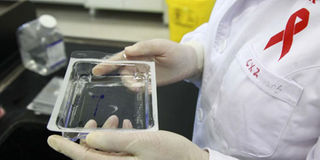Prime
I was almost infected with HIV in line of duty

Preventive treatment can be given to health workers exposed to HIV infection in the line of duty
What you need to know:
When discussing HIV infection, emphasis is placed on sexual and mother-to-child transmission of the disease but health workers are also at risk in the line of duty. Patrick Wabuteya spoke to a trainee clinical officer, who had to undergo emergency HIV preventive treatment.
Tales have been told of how people have cheated death. Some survived road traffic accidents, fires and in many other ways, but few actually make it through illnesses especially those that take a life time such as HIV/Aids or cancer.
Ronald Lutaaya, 21, a clinical officer trainee at Fort Portal School of Clinical Officers is one of the many who has a story to tell of a close brush with the HIV infection.
How it happened
“I was in my first year of clinical school when it happened. At the time we had just started clinical practice and most of us were actually excited to go to hospital and carry out the nursing procedures we had studied in class.
So on that fateful Sunday night, I went to the females’ medical ward for drug administration and I was supposed to change a cannula on one of the patients because the one she had was blocked.
I succeeded in fixing it. Unfortunately, in the process of pulling the needle out, the patient jerked her hand and I pricked myself.
In class, we had been warned several times about such accidents. I never thought it would ever happen to me.
With the blood oozing from under the glove I was wearing, fear started to build up in me. I hurried to check the patient’s file for her HIV status. My nervousness only grew worse when I discovered that the patient was HIV-positive and had been on anti-retroviral treatment (ART) for six years.
After exposure
I could not believe that I may have contracted the deadly virus. I was in a panic and could not hold back tears. However much my colleagues tried to console me, I hated myself for having gone to hospital that evening. I could not stop asking why God had let something like that happen to me.
My colleagues advised me to report the issue to the nurse on call that night, who then referred me to the deputy medical superintendent.
In her office, after listening to my story, she tried to calm me down by asking me not to be afraid. She told me about many other people including some doctors who had also suffered needle-stick injuries but didn’t get infected.
She also told me about post exposure prophylaxis (PEP), which reassured me that I could actually survive the infection.
She asked me to see her again the following morning so that I could be initiated on the PEP. I slept with a heavy heart and I could not wait for the morning to start taking the medication.”
Being initated on prophylaxis
“The following morning, while my classmates headed for lectures, I walked down to the hospital to see the medical superintendent again. I felt bad going to that same ward because I could not bear to look at that patient again. At about 8.30am, the superintendent came and escorted me to see a counsellor at the anti-retroviral treatment (ART) clinic where she explained my issue, concluding that I had to be initiated on PEP.
The counsellor was sympathetic; telling me not to worry and that there was still a chance that I could survive the infection. She also informed me that before initiation on the preventive medication, I had to be tested first to confirm that I was HIV-negative and that scared me too because I had not had an HIV test in a long time. The blood sample was taken and in about half an hour, the results were back. I was HIV negative.
The counsellor then took me to one of the consultation rooms to see the doctor who was to initiate me on the PEP. The distance from the counsellor’s office to the consultation room, though short, seemed very long for me as we passed the long queue of other patients who were waiting patiently to get their medications. I kept thinking that if this failed, I would eventually end up like them.
In the consultation room, I was put on a regimen of three drugs, Tenofovir, Lamivudine and Effavirenz; all ART drugs which I was to take every day for the next 30 days.
Before getting my prescription, the counsellor advised me to take the drugs at night so as not to be affected much by their side effects such as severe dizziness.
She also warned me that the drugs could also possibly cause nightmares and that I should not be scared if I got any. For the best results, she asked me to adhere to the treatment and not to give up, however tough it would get. From the ART pharmacy, I left with my tin of ARVs in my pocket and that night at 8pm, I swallowed my first tablet.”
what it means to be on post exposure prophylaxis
“Taking HIV medications is not as simple as it sounds, least of all when you know you are not HIV-positive. It is no surprise that most people who are initiated on the Post Exposure Prophylaxis (PEP) regimen fail to complete the dose because it is tough.
Whenever I looked at that big, long tablet in my palm, I felt like defaulting but a part of me was determined because I feared the infection.
On the fourth night after starting the medication, I had my first nightmare, but that did not scare me. Instead, it encouraged me that the drugs were actually working.
On the days that followed, I suffered from severe dizziness, which affected my lecture attendance and I lost all interest in going to hospital.
To kill the PEP stigma in me, at the end of the first week on medication, I opened up to some of my classmates that I was on medication. As expected, some laughed at me, but most empathised with me.
After the second week on PEP, I was supposed to go back to the clinic for another HIV test, but I feared to. So I postponed the test to the next week and when results came back, I was negative. I was so excited that I felt like pinning the results on the class noticeboard. This encouraged me to complete my dose. In the final week of the PEP regimen, I gave a testimony during church service on how God had saved me from HIV infection.
Truthfully, I never went back for the other tests I was supposed to take and I only tested again last week when I was to undergo circumcision.”
Turning point
“Stepping in the shoes of an HIV/Aids patient for that one month was a turning point for me. It made me realise how vulnerable we all are to getting the virus and that sexual contact is not the only way one can get infected like most people think. I now treat HIV positive patients with much more respect because, at least, I have an idea what it feels being like them, moreover theirs’ is a lifetime condition.
I advise all people to be keen and protect themselves in all possible ways from infection. Even those on medication should adhere to the treatment and not default, for the betterment of their health.”
ronald lutaaya, fort portal
About post exposure prophylaxis
According to Dr Ernest Mayinja of Fort Portal Regional Referral hospital, Post Exposure Prophylaxis is a measure of preventing HIV infection after exposure to the virus often through infectious body fluids from a known HIV positive patient. “PEP is not a 100 per cent treatment for HIV exposure. Its effectiveness depends on a number of factors such as the mode in which someone got exposed, period in which the victim is initiated on the medication as well as the viral load (amount of virus) of the patient’s blood from whom the victim got the virus,” Mayinja adds
He also stresses that the purpose of treatment is to stop viral division (replication) in the victim’s blood so that it does not spread in the victim’s body. With time, the affected body cells die away and the victim is then free from the virus. “The victim should start the regimen, usually of three anti-retroviral drugs (ART) within a maximum time of three days (72 hours) and they should be taken daily for a whole month. Drugs usually prescribed include Zidovudine, Tenofovir, Lamivudine, and Effavirenz.
We warn those initiated on the regimen of the possible side effects of the drugs especially the dizziness, nausea, diarrhoea, body weakness and even vivid dreams such as nightmares. We also advise them to have proper nutrition while on the medication and to take plenty of fluids.
After a month of medication, the patient is tested again and if negative, he or she is retested in three months.”
According to Dr Mayinja, the tests that can be done range from the routine strip tests like Determine, Statpack and Unigold to the highly specific Polymerase chain reaction (PCR) tests, which detect HIV DNA. He, however, reports that the biggest challenges reported by those enrolled on PEP include the side effects of the drugs which cause most people to discontinue treatment before completing the dose.
By Patrick Wabuteya




